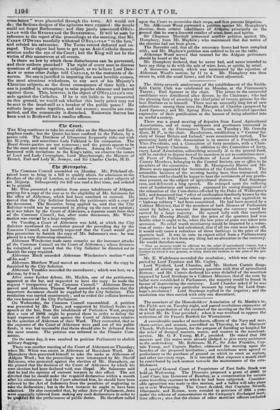The thirty-seventh anniversary of the establishment of the Smith- field
Cattle Club was celebrated on Monday, at the Freemason's Tavern ; Earl Spencer in the chair. The prizes to the successful candidates were distributed after dinner, by the Chairman ; who had the pleasing duty of awarding the chief prize of twenty guineas for the best Durham ox to himself. There was an unusually long list of new subscribers : among them were the Marquis of Chandos (proposed by Lord Spencer,) and Mr. Spring Rice; who both delivered speeches expressive of their gratification at the honour of being admitted into so useful a society.
There was a grand meeting of deputies from Local Agricultural Associations, and of many noblemen and gentlemen interested in agriculture, at the Freemason's Tavern, on Tuesday ; Mr. Ormsby Gore, M. P., in the chair. Resolutions, establishing a " Central So- ciety of Great Britain and Ireland," were unanimously carried. The governing body of this Association is to consist of a President, six Vice-Presidents, and a Committee of forty members, with a Chair- man and Deputy Chairman. In addition to this Committee of forty, every Local Association, subscribing annually 5l. to the general fund, will be entitled to depute two of its members to act as committee-men : all Peers of Parliament, Presidents of Local Associations, and County Members, belonging to the Central Society, are ex officio to be members of the committee. Mr. R. Montgomery Martin and Mr. Brown were appointed the Secretaries of the Central Society. The ostensible business of the meeting having been thus transacted, the Chairman said he should be happy to hear the sentiments of any gentle- man present, on the subject of agricultural distress. Earl Stanhope rose, and delivered a long speech. He enlarged upon the suffering state of landowners and tenants; expressed his strong disapproval of the relaxation of the Corn-duties effected by the Duke of Wellington's bill ; and denounced that "edict of confiscation familiarly known by the name of Peel's Bill," under whose provisions what was equivalent to "highway robbery" had been committed. He had been assured by a Cabinet Minister, that if the members of both Houses of Parliament voted by ballot, a measure for depreciating the currency would be carried by a large majority. He agreed fully with that excellent paper the Morning Herald, that the price of the quartern loaf was double what it ought to be, when the low price of grain was taken into acccount. No relief worth mentioning would be imparted by a reduc- tion of rents : for he had calculated, that if all the rent were taken off, it would only cause a reduction of three farthings in the price of the quartern loaf. It was in vain to expect relief from a Parliamentary Committee, or in fact from any thing but an alteration in the currency. He would therefore move, " That no measure would be efficient for the relief Of agricultural iiistress, but a measure which should either raiFe the price of agricultural produce to the 'weight of the burdens by which it was pressed, or bring down the burdens to the price of the pro- duce."
Mr. E. 1Vodehouse seconded the resolution ; which was also sup- ported by Lord Teynham and Mr. Cayley. Lord Wynford, Lord Chandos, and Mr. Herbert Curteis disap- pointed of mixing up the currency question with that of agricultural distress : and Mr. Curteis declared his utter disbelief of the assertion imputed by Lord Stanhope to a Cabinet Minister, that if the vote by ballot were established in Parliament, the majority would be found in favour of depreciating the currency. Lord Chandos asked if he was pledged to support any particular measure by voting for Lord Stan- hope's resolution ? Lord Stanhope replied in the negative; and the resolution was then carried with only one dissentient.


























 Previous page
Previous page